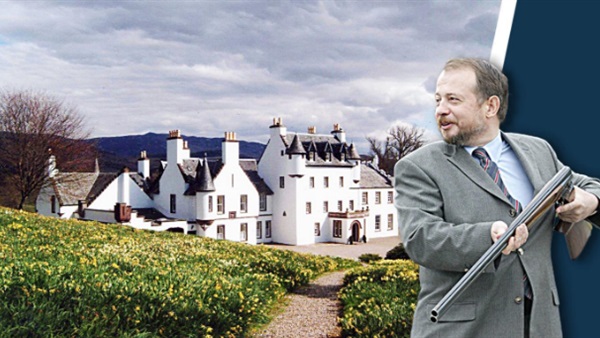Russian ‘laird’ Vladimir Lisin supplies steel to Kremlin weapons firms

Russia’s richest man, who owns luxury properties in the UK, has supplied steel to companies that manufacture nuclear weapons and ballistic missiles, an investigation by The Times has found.
Vladimir Lisin, who is estimated by Forbes to be worth about £21 billion, and his family have an £11 million London townhouse, a £7 million Scottish castle and two luxury villas on the French riviera. Lisin’s Scottish estate has received £700,000 of UK taxpayers’ money in agricultural subsidies. Until last year Lisin was president of the European Shooting Confederation. Australia is the only country to have sanctioned him.
Lisin’s steel company, NLMK, which is Russian, has subsidiaries across Europe and the US and a sales turnover of more than $16 billion. It has supplied steel to Russian companies that manufacture anti-aircraft and intercontinental ballistic missile systems.
Last week a group of NGOs submitted an evidence package to the Foreign, Commonwealth and Development Office calling for Lisin to be sanctioned. The FCDO has refused to comment on whether it is investigating Lisin.
“Ukraine believes Vladimir Lisin ought to be a priority target for the allied democracies and we recently sanctioned him ourselves,” Vladislav Vlasiuk, an adviser on sanctions to President Zelensky’s office, said.
“In addition to providing significant revenue for the Russian economy, the companies owned and controlled by Mr Lisin . . . have been supplying steel products to Russian defence manufacturers and are thus engaged in the chain of production if arms before they are sent to the battlefields in Ukraine.”
A Russian government procurement website detailed how NLMK had supplied steel for electrical steel to at least eight Russian companies that specialise in the manufacture of arms since 2014, the year President Putin ordered the invasion and annexation of Crimea and a Russian made anti-aircraft missile shot down a civilian airliner over Ukraine’s Donbas region.
“The extent to which businesses which may support the Russian war effort have investments and assets here is testament to how Britain has dropped its guard in return for a quick buck,” Steve Goodrich, the head of research and investigations at Transparency International, said.
The agreements for sales by NLMK to arms companies included rolled steel sheets, structural stainless steel, low magnetic alloys, electrical steel tape, Armco steel and cold-rolled clad steel, the website records.
NLMK acknowledged the existence of the contracts but argued that the sales to those companies were “negligible”, amounting to $1.6 million of “civilian grade” steel over the past ten years, and that the sales concerned only commercial electrical steel. In Russia, civilian grade products are those that do not require specific regulation for sale. NLMK did not provide the tonnage that had been sold for that price when the information was requested.
“The Russian operations of NLMK are not capable of producing steel intended for military applications,” the company wrote. “Our operations focus solely on producing rolled strip steel intended for general civilian use. NLMK has never supplied military intended products to the Russian military-industrial complex.
“That said, NLMK cannot control end uses of its civilian products.”
Even in small quantities, rolled strip steel can form an essential part of a missile, a weapons expert at the Rusi think tank said. “Electric steel and low magnetic steel alloys can be used in the motors of missiles, particularly solid propellant motors,” Sidharth Kaushal, research fellow in military sciences at Rusi, added.
Lisin came out against Moscow’s full-scale invasion of Ukraine in March, calling for a “peaceful diplomatic conflict resolution”. He expressed compassion for “all the victims of the armed conflict”, calling the “lost lives” a “huge tragedy that is impossible to justify”. NLMK said it had tried to minimise its relationship with the Russian state, with sales of less than 1 per cent of the group’s total revenue to Kremlin-controlled companies.
A joint team of investigators from The Times, the Swiss newspaper Le Temps, the French investigative website Disclose and a group of Ukrainian and Russian anti-corruption organisations uncovered details of 18 contracts between NLMK and the defence sector on the Russian government website, signed after the Kremlin first invaded Ukraine in 2014.
The site ceased to publish after 2019 and NLMK declined to comment on whether it continues to fulfil contracts with the Russian defence sector.





